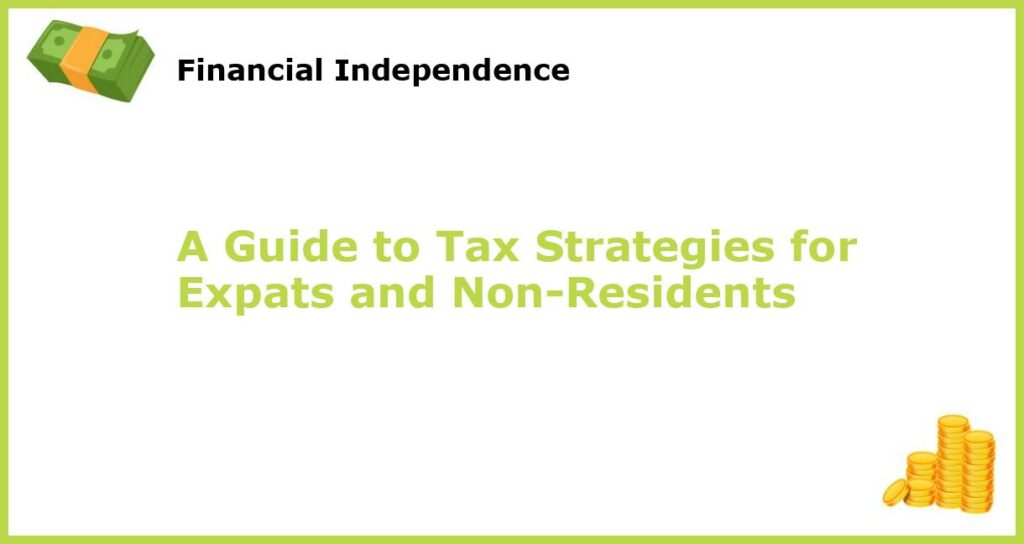Being an expat or non-resident presents unique challenges when it comes to tax planning. As an expat or non-resident, it is advisable to be familiar with the tax laws in your current country of residence. This is essential to avoid paying unnecessary taxes and missing valuable deductions. Tax planning for expats and non-residents is, therefore, crucial to managing their tax burden. By planning how to manage taxes, one can ensure they keep more of their hard-earned money.
How to Determine your Tax Residency Status

Determining tax residency status is the first step in tax planning for expats and non-residents. Tax residency is not always clear. Several factors work to determine residency, including where your income arises, the amount of time spent in the current country of residence, and having a permanent home or family ties in another country. You may be a resident in one country and a non-resident in another. This is where knowing your residency status can go a long way in helping you understand your tax obligations.
For instance, in the United States, a green card holder is categorized as a permanent resident for tax purposes. As such, they are required to file an annual tax return regardless of whether they live in the United States or not. Understanding your tax residency status will go a long way in helping you manage your tax burden in your country of residence.
The Importance of Treaty Planning

Treaty planning is crucial for individuals living and earning income in different countries. Countries often enter into tax treaties to determine how to tax individuals who earn income in different countries. Tax treaties provide ways of ensuring that individuals are not double-taxed on their income. For instance, some tax treaties provide tax relief for multinational companies and minimize their tax burden. That said, failure to take advantage of applicable tax treaties means missing out on tax benefits.
Maximizing Deductions for Business Owners

If you are an expat or non-resident business owner, you may have the opportunity to claim certain deductions, including expenses related to your business, such as travel, equipment, and office rent. Identifying and utilizing all available deductions can lower the tax burden and help save thousands of dollars. For instance, if an expat is running a business that incurs traveling expenses, those expenses can be deducted, lowering the overall taxable income of the business.
Working with an experienced tax and accounting professional can help business owners identify all deductible expenses and ensure their tax filing is accurate.
Investment Strategies for Non-Residents

Investing as a non-resident can be challenging, as many financial institutions and investment products may not be available to non-residents. This makes investing in tax-advantaged retirement accounts, or utilizing foreign tax credits, some of the few investment strategies available for non-residents. Tax-advantaged retirement accounts, such as an Individual Retirement Account (IRA) or a 401(k), provide significant tax advantages and make up for the limited investment options available to non-residents.
An expat or non-resident who runs a profitable business may also be eligible for foreign tax credits to offset taxes paid to their country of residence. This is one example of how strategic investment can offset the tax burden of non-resident individuals.
The Risks of Non-Compliance
Understanding and complying with relevant tax laws is a crucial aspect of tax planning for expats and non-residents. Non-compliance can carry severe consequences, including but not limited to, penalties, fines, and even criminal charges. Every country has different tax laws and filing requirements, making it essential to seek professional tax advice to help maneuver through them.
By employing a professional, you can promptly file for tax returns, reducing the chances of incurring legal action. That said, it’s crucial to stay up-to-date with the tax laws that affect you and any updates that may arise in your country of residence.
The Benefits of Working with a Tax Professional
Working with tax and accounting professionals can provide a range of benefits for expat and non-resident tax planning. They understand the intricacies of tax laws in different jurisdictions; hence can identify tax strategies that can help minimize tax burden. They can make sure you’re compliant with tax laws, and provide peace of mind that your finances are in order. A tax professional will also make sure you’re aware of all the deductions that apply to your situation, while keeping you abreast with any law changes that may affect your tax obligations.
Establishing a relationship with your tax professional is vital to help you optimize your finances, both for tax purposes and investments. They will be with you every step of the way, from the initial assessment, strategy implementation, to maintaining compliance.
Cross-Border Estate Planning
Cross-border estate planning presents unique challenges for expats and non-residents. Estate planning for non-residents means navigating complex tax jurisdictions. Despite the complexities, tax obligations for estate planning must be met, and assets should be transferred according to your wishes. Working with an estate planning professional with a background in cross-border issues will help to minimize tax burdens on your heirs.
It is essential to make sure that estate planning is compliant with tax regulations of the country of residency and any other country where the assets are located. Estate planning is a critical component of financial planning and must align with an individual’s overall objectives and goals.
The Role of Technology in Tax Planning
The role of technology in tax planning for expats and non-residents is an essential component of tax planning. Many accounting firms now offer a wide range of cloud-based solutions that provide access to integrated business and financial management services. Such solutions allow clients to track their finances, collaborate with accountants effectively, manage bookkeeping, and facilitate tax filing. Cloud-based solutions can provide a significant competitive advantage to companies that operate across different jurisdictions.
Digital tools have streamlined the tax-planning process, ultimately reducing the time and costs associated with tax filings. Tax-planning has become more accessible for expats and non-residents as clients can access cloud-based accounting solutions that are easy to use, cost-effective, and secure.
Continuing Education for Expat and Non-Resident Tax Planning
Continuing education ensures that expats and non-residents stay updated with the tax laws in their country of residence. The tax laws that affect you will change at some point, making it critical to stay informed on any tax law changes that could impact your tax obligations. Continuing education courses and seminars inform and provide updates on new tax strategies and deductions that are available. These sessions provide an avenue for networking with tax and accounting professionals, empowering expats and non-residents with accurate information regarding their tax planning.
Continuing education and professional development courses help individuals stay informed of new tax laws, tax planning strategies, and retirement plans. This allows individuals to optimize their tax planning and improve their financial strength.







